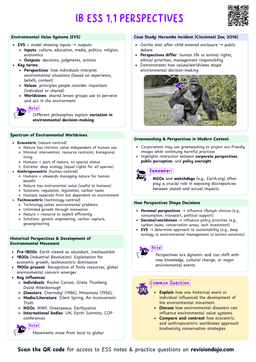Ethics
Ethics
Ethics is a branch of philosophy that examines moral principles and determines what behaviors are right or wrong.
- In environmental science, ethics plays a crucial role in shaping policies, decision-making, and conservation efforts.
- Different ethical perspectives influence how societies interact with the environment and allocate resources.
Key Environmental Ethical Perspectives
Anthropocentrism (Human-Centered Ethics)
- Views humans as the most important species.
- Nature is valued only if it benefits humans.
Economic development often prioritizes human needs over environmental concerns (e.g., deforestation for agriculture).
Ecocentrism (Earth-Centered Ethics)
- Values the intrinsic worth of nature, independent of human use.
- Promotes ecosystem preservation over human exploitation.
Conservation movements advocating for protected areas and biodiversity conservation.
Biocentrism (Life-Centered Ethics)
- All living organisms have inherent value.
- Ethical responsibility to minimize harm to all life forms.
Animal rights activism against deforestation, habitat destruction, or species extinction.
Deep Ecology
- Emphasizes harmony between humans and nature.
- Calls for radical lifestyle changes to minimize ecological footprints.
Movements promoting zero waste, minimalism, and sustainable living.
Environmental Justice
- Focuses on fair distribution of environmental benefits and burdens.
- Recognizes that marginalized communities often suffer disproportionately from pollution and climate change.
Protests against toxic waste dumping in low-income areas.
Ethical Dilemmas in Environmental Science
- Climate Change Responsibility: Who should be held accountable for reducing emissions: developed countries (historical polluters) or developing nations (current rapid emitters)?
- Conservation vs. Development: Should economic progress be prioritized over protecting endangered species and habitats?
- Indigenous Rights and Land Use: Should governments and corporations have the right to exploit indigenous lands for resources?
- Genetically Modified Organisms (GMOs): Are GMOs an ethical solution to food insecurity, or do they threaten biodiversity and health?
Environmental Ethics: An Overview
Environmental ethics
Environmental ethics is a branch of ethical philosophy that deals with the moral relationship between humans and the environment.
- It emerged in the 1960s and 1970s, driven by growing environmental awareness and concerns about pollution, resource depletion, and biodiversity loss.
- Traditional Western ethics primarily focused on human interactions but lacked frameworks to address the ethical status of non-human and non-living entities in nature.
Key Environmental Ethical Perspectives
Anthropocentrism (Human-Centered Ethics)
- Views humans as the most important species.
- Nature is valued only if it benefits humans.
Economic development often prioritizes human needs over environmental concerns (e.g., deforestation for agriculture).
Ecocentrism (Earth-Centered Ethics)
- Values the intrinsic worth of nature, independent of human use.
- Promotes ecosystem preservation over human exploitation.
Conservation movements advocating for protected areas and biodiversity conservation.
Biocentrism (Life-Centered Ethics)
- All living organisms have inherent value.
- Ethical responsibility to minimize harm to all life forms.
Animal rights activism against deforestation, habitat destruction, or species extinction.
Deep Ecology
- Emphasizes harmony between humans and nature.
- Calls for radical lifestyle changes to minimize ecological footprints.
Movements promoting zero waste, minimalism, and sustainable living.
Environmental Justice
- Focuses on fair distribution of environmental benefits and burdens.
- Recognizes that marginalized communities often suffer disproportionately from pollution and climate change.
Protests against toxic waste dumping in low-income areas.
Ethical Issues in Environmental Science
- Climate Change Responsibility: Should developed nations, responsible for historic emissions, bear more responsibility for mitigation?
- Resource Exploitation vs. Conservation: Should economic growth be prioritized over protecting forests, oceans, and biodiversity?
- Animal Rights vs. Human Needs: Should industries that harm animals (e.g., factory farming) be strictly regulated, even if they provide affordable food?
- Sustainable Development: Can economic progress be achieved without depleting natural resources?
Ethical Frameworks in Environmental Decision-Making
- Environmental ethics explores how humans should interact with nature and the moral obligations we have toward the environment.
- Different ethical frameworks arise based on fundamental beliefs about the relationship between humans and nature, leading to conflicting ethical values in decision-making.
Key Ethical Frameworks in Environmental Ethics
Ecocentrism (Nature-Centered Ethics)
- Views all living and non-living parts of the environment as having intrinsic value.
- Humans are not superior but rather a part of the natural system.
- Leads to strong conservation efforts, prioritizing ecosystem health over economic interests.
Stewardship Ethics
- Humans are part of nature but have a special responsibility to care for and manage it sustainably.
- Ethical decisions are made with a duty to future generations in mind.
Conservation programs that balance environmental protection with responsible resource use (e.g., sustainable forestry and agriculture).
Anthropocentrism (Human-Centered Ethics)
- Nature is valued instrumentally (for its usefulness to humans).
- Environmental decisions focus on maximizing human welfare.
- Can range from weak anthropocentrism (including environmental protection for long-term human benefits) to strong anthropocentrism (prioritizing immediate economic gains over ecological concerns).
Large-scale deforestation for urban development or agriculture, justified by the economic benefits.
Technocentrism (Technology-Based Ethics)
- Believes technological advancements can solve environmental problems.
- Prioritizes human ingenuity and scientific progress over restrictive environmental regulations.
Geoengineering solutions to climate change, such as carbon capture or artificial trees.
Conflicting Ethical Values in Decision-Making
Conservation vs. Economic Growth
- Ecocentric View: Protecting forests and biodiversity is essential, even if it limits economic activities.
- Anthropocentric/Technocentric View: Economic growth is crucial, deforestation can be justified if reforestation or technological fixes are available.
Climate Change Responsibility
- Stewardship View: Nations should act responsibly to reduce emissions for future generations.
- Anthropocentric View: Economic priorities may outweigh immediate climate action, especially in developing nations.
Biodiversity Protection vs. Human Development
- Ecocentric View: All species have equal rights, and habitat destruction for human development is unethical.
- Anthropocentric View: Nature should be utilized to benefit the greatest number of people.


